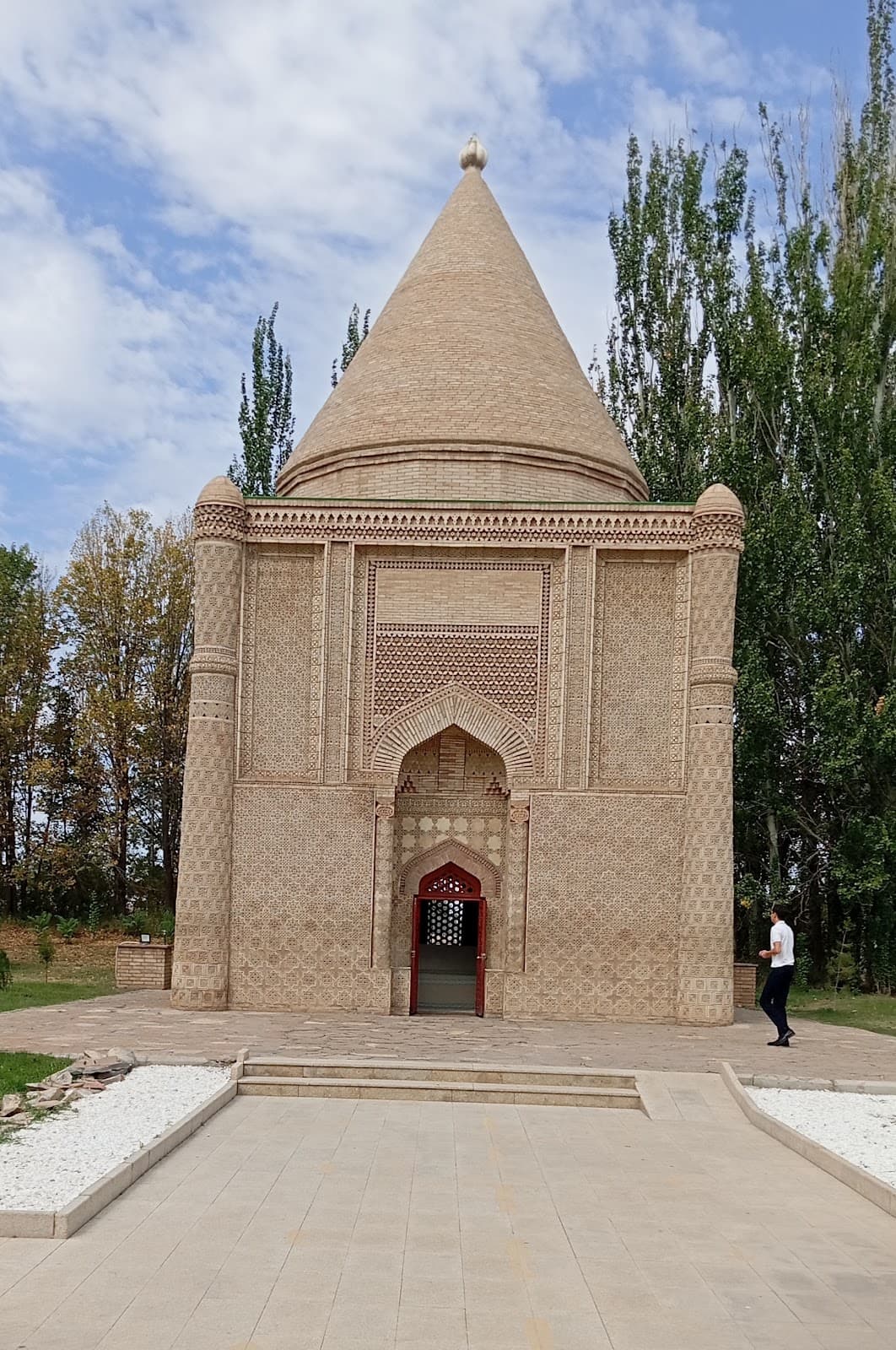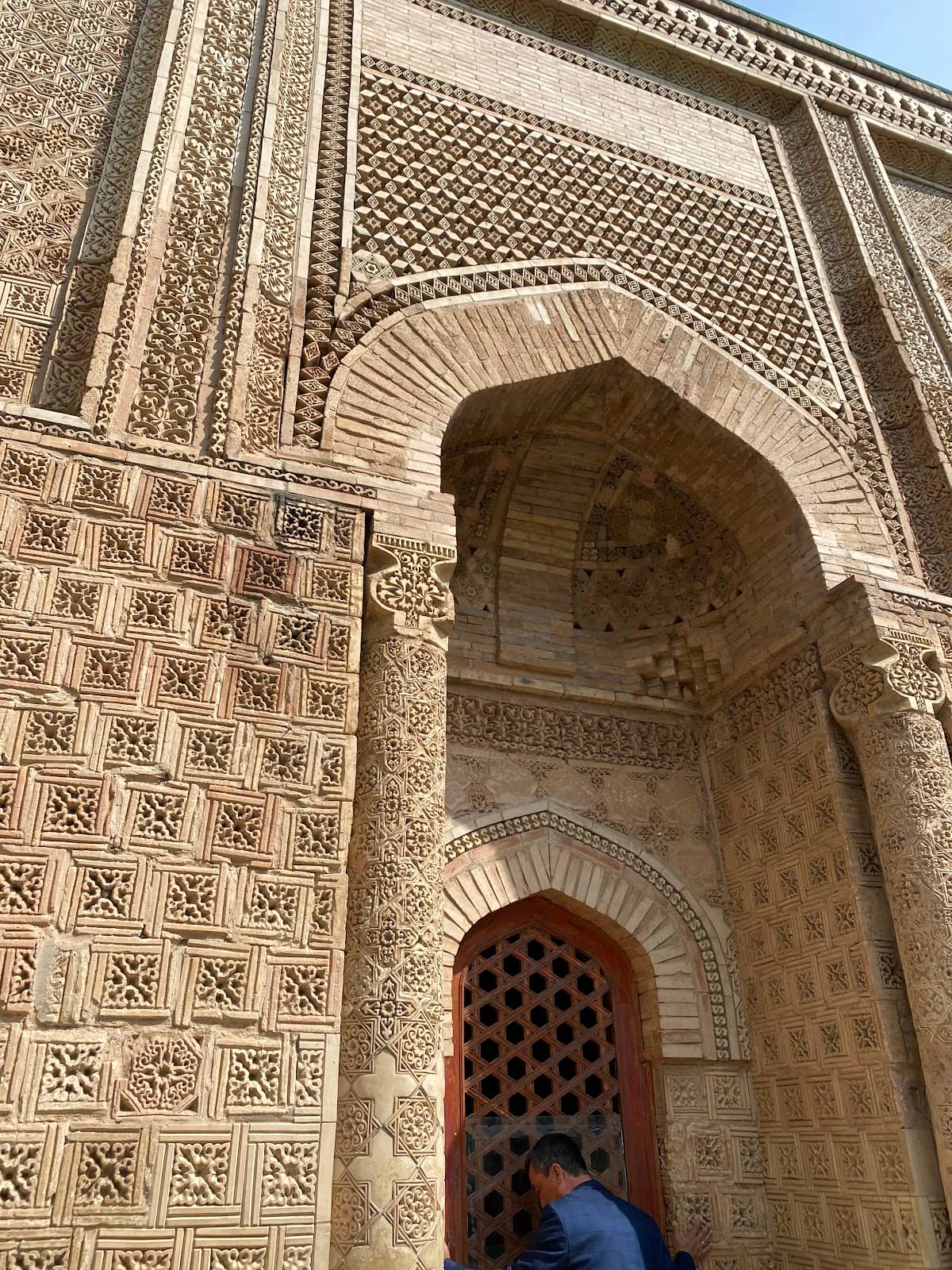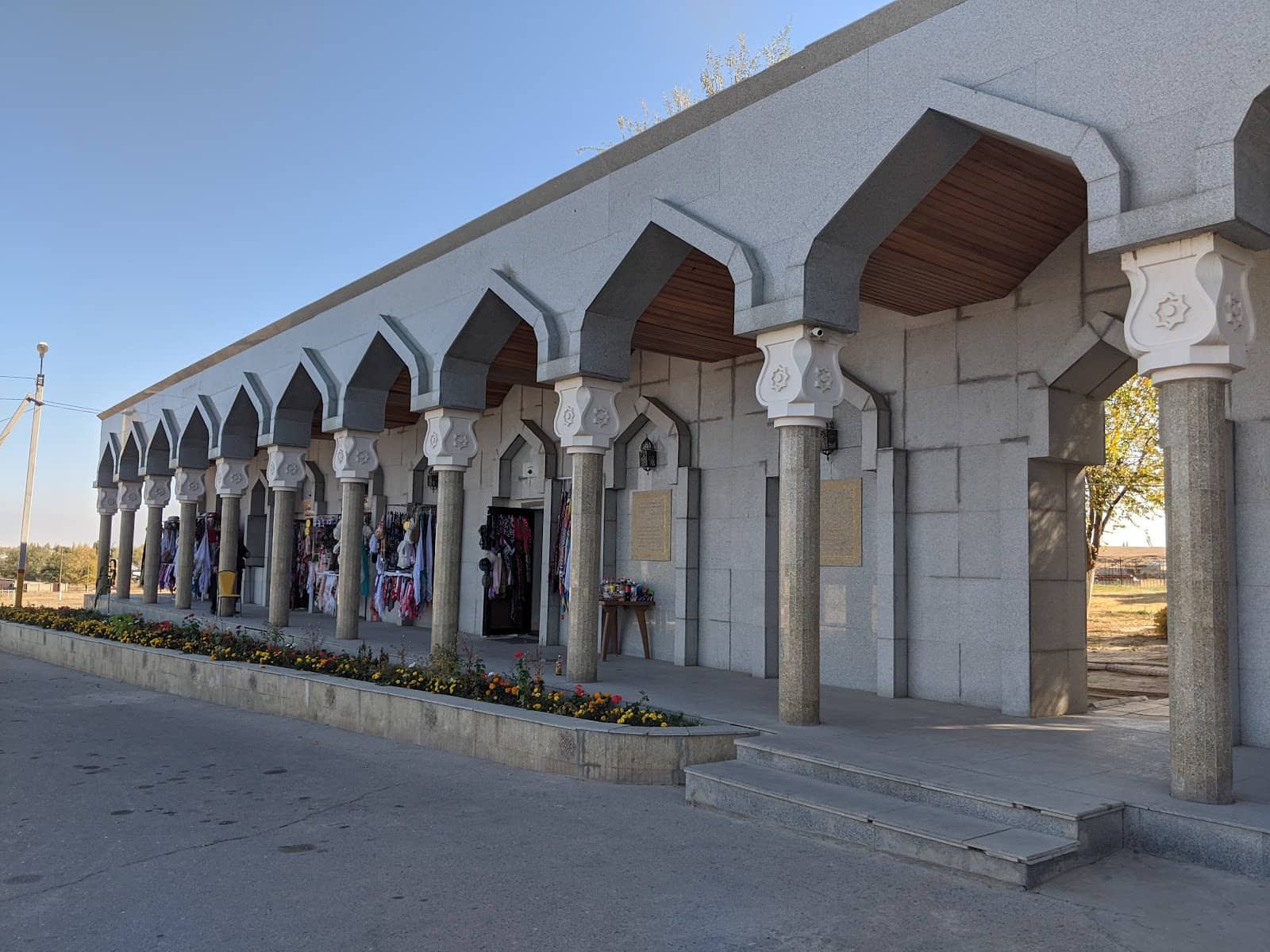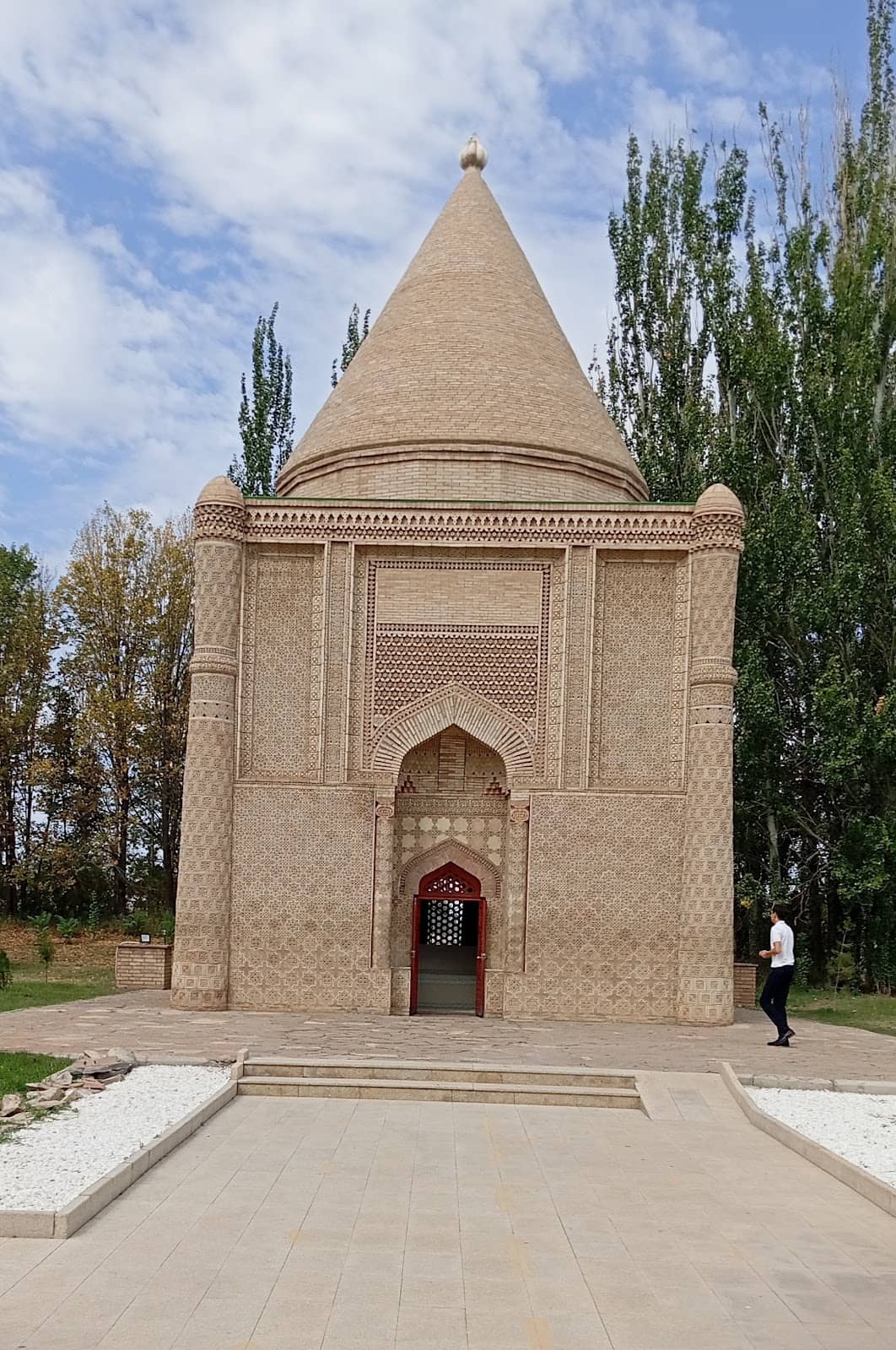
Aisha Bibi Mausoleum Taraz
A 11th-12th century mausoleum famed for intricate terracotta tiles and a tragic love story, a jewel of medieval Central Asian architecture.
Highlights
Must-see attractions

Social
From TikTok & Reddit
Best Time
Pleasant weather, blooming roses

Aisha Bibi Mausoleum Taraz
Best Time
Pleasant weather, blooming roses
Highlights
Must-see attractions
A 11th-12th century mausoleum famed for intricate terracotta tiles and a tragic love story, a jewel of medieval Central Asian architecture.
"A testament to rich history and artistry, this mausoleum captivates with its romantic backstory and architectural beauty."

Dress Modestly
Cover shoulders and knees out of respect for this sacred site. :pray:
Taxi Logistics
Book Yandex from Taraz, but be prepared to walk for return pickup. :taxi:

Highlights
Discover the most iconic attractions and experiences

Intricate Terracotta Tiles
Exterior walls
Marvel at over sixty unique geometric and floral patterns carved into the terracotta, a testament to medieval artistry.

Conical Roof
Above the main structure
A striking modern addition that crowns the ancient mausoleum, adding to its unique silhouette.

Rose Gardens
Surrounding grounds
Enjoy a peaceful stroll through the well-maintained rose gardens, offering a serene atmosphere.
Plans like a pro.
Thinks like you
Planning Your Visit
Respectful Visitation
Getting There & Back
Best Times
Insider Tips
from TikTok, Instagram & Reddit
Dress Modestly
Cover shoulders and knees out of respect for this sacred site. :pray:
Taxi Logistics
Book Yandex from Taraz, but be prepared to walk for return pickup. :taxi:
Admission Fee
A small fee of 200 tenge grants access to this historical gem. :moneybag:
Peaceful Atmosphere
Enjoy the tranquility; it's a well-maintained mosque perfect for quiet reflection. :dove:
Tips
from all over the internet
Dress Modestly
Cover shoulders and knees out of respect for this sacred site. :pray:
Taxi Logistics
Book Yandex from Taraz, but be prepared to walk for return pickup. :taxi:
Admission Fee
A small fee of 200 tenge grants access to this historical gem. :moneybag:
Peaceful Atmosphere
Enjoy the tranquility; it's a well-maintained mosque perfect for quiet reflection. :dove:
What Travellers Say
Reviews Summary
Visitors praise the Aisha Bibi Mausoleum for its stunning medieval architecture, particularly the intricate terracotta tilework, and its serene atmosphere. The tragic love story associated with the site adds a layer of romantic mystique. While the site is small, its historical and cultural significance is undeniable, offering a peaceful pilgrimage and a glimpse into Kazakhstan's rich past.
"The Aisha Bibi Mausoleum (Айша Бибі кесенесі) is a historic and culturally significant monument located near Taraz in Kazakhstan. Built between the 11th and 12th centuries, this mausoleum is known for its intricate terracotta tile work and Islamic architecture. Legend has it that the mausoleum was constructed in memory of Aisha Bibi, a noblewoman engaged to the famous ruler Karakhan, who died tragically before their marriage.
The structure's detailed craftsmanship includes carved tiles that depict geometric and floral patterns, symbolizing eternal life and purity. Despite centuries of wear, the mausoleum stands as a testament to the rich history and artistry of the region. A place of pilgrimage and cultural interest, it continues to attract visitors intrigued by its romantic backstory and architectural beauty. Restored in recent years, the Aisha Bibi Mausoleum offers a glimpse into the medieval history of Kazakhstan and remains one of the country's treasured landmarks."
aj
"The place is not big. It is a peaceful mosque which is maintained very well. It is very clean and organized. The admission fee is 200 tenge. There are two praying rooms you can visit. Visit with respect.
As of June 2024, you can call Yandex from town to the mosque for about 2500-3000 tenge. On the way back, you have to walk out toward the main road for about 200 meters. Yendex is not available at the mosque entrance."
Kae
"Architectural monument built between the eleventh and twelfth centuries, situated in the village by the same name, eighteen kilometers east of Taraz. Together with the mausoleum of Babadzha Khatun, it bears witness to a high standard of architecture. The original nature of the construction methods, the architectural forms and the decorative solutions found here, in the mausoleum of Babadzha Khatun and in other poorly preserved monuments dating from the tenth-twelfth centuries has led scholars to theorize the existence of a school of architecture in northern Turkestan, characterized by close bonds with the traditions of the steppes.
Studied at various times by eminent researchers of various nationalities, among the others the Russian archaeologist V.V. Barthold in 1893, the mausoleum was built on the orders of Karakhan (ca. 1042 - ca. 1052), the governor of the city of Taraz, in memory of Aysha Bibi, who was to have been his bride.
The building has a square floor plan of seven and a half meters, in the centre stands the tombstone (3 x 1.4 m). The interior walls are in raw brick, while on the outside they are clad in tiles with engraved geometric and floral motifs. It is possible to see more than sixty different types of decoration on the tiles used to embellish the exterior walls. These façades are identical: the terracotta panels help to create the illusion of masslessness typical of the Islamic architecture. At the same time, the terracotta decoration uses light and shadow rather than color to create movement on the facades according to the pre-Mongol style. Functionally, this type of decoration scatters the light so the viewer is not blinded as he might be from a smooth light colored wall in full sun. There are four entrances through niches, one on each side, equal in size and shape. On the corners there are four columns and at the point of constriction in each column there is band of calligraphy. In general they descrive the beauty of Aysha Bibi and of love in general: one of the old distichs reads: “Autumn … Clouds … The Earth is beautiful”. The conical roof that now soars above the mausoleum, is a modern addition, since the mausoleum never had either a dome or a conical roof. The mausoleum of Aysha Bibi was completely restored in 2004.
According to the most common and best-known legend, Aysha Bibi was the daughter of an important scholar and famous poet of the eleventh century, Khakim Suleyman Bykyrgan. After the death of her father, she was educated at the court of the sheik Aykozh. One day the governor of the city of Taraz, Karakhan Mukhammed (in honor of whom the Mausoleum of Taraz was erected) asked for her hand, which was refused by the sheikh in person, so the girl, with a subterfuge, tried to go to Taraz alone. However, her future husband never met her, because Aysha Bibi died on the banks of the river, bitten by a snake that had hidden in her headdress. Desolated by this sudden misfortune, Karakhan had a mausoleum built at the scene of the tragic event. Babadzha Katun, friend and handmaiden (she may have been the wet nurse, perhaps the servant) of Aysha Bibi, remained as the custodian of the mausoleum and on her death was buried in a tomb nearby.
According to another version, Aysha Bibi lived near the city of Tashkent around the eleventh or twelfth century. One day Karakhan, one of the governors of the state of Karakhanid, came to visit Aygozh, the father of the beautiful girl. The two young people immediately fell in love, but Karakhan had to return to Taraz to face attacks by his enemies and the two could not meet for some time. Aysha Bibi asked her father for permission to leave and go to Karakhan, but when her father refused she disobeyed him and left for Taraz in the company of forty handmaidens and servants. However, during the journey Aysha Bibi died of a snakebite. As the first version of the story tells us, Karakhan, as a sign of his love for the girl, had a commemorative monument built."
Gian Luca Bonora
What People Like
What People Dislike
Frequently Asked Questions
🚇 🗺️ Getting There
The most common way is by taxi, such as Yandex, which costs approximately 2500-3000 tenge from Taraz. The mausoleum is located about 18 kilometers east of Taraz.
Public transport options are limited. Taxis are the most convenient, but be aware that Yandex services might not be available directly at the mausoleum for your return journey.
While possible, it's a significant distance from Taraz. It's recommended to use a taxi for the journey to and from the mausoleum.
It's advisable to arrange your return trip with your initial taxi driver or be prepared to walk about 200 meters to the main road to hail a taxi.
Information on dedicated parking is scarce, but taxis typically drop off visitors near the entrance. If driving yourself, inquire locally upon arrival.
🎫 🎫 Tickets & Entry
The admission fee is a modest 200 tenge. This fee contributes to the upkeep of this historic site.
While specific hours aren't always listed, it's generally accessible during daylight hours. As it's also a functioning mosque, it's best to visit respectfully outside of prayer times.
No advance booking is typically required for general visits. Tickets can be purchased upon arrival at the site.
Yes, as it's a sacred site and mosque, visitors are expected to dress modestly. This means covering shoulders and knees.
Photography rules can vary. It's best to be discreet and respectful. Check for any posted signs or ask local staff if photography is permitted inside.
🎫 🏛️ Onsite Experience
Built between the 11th and 12th centuries, it's a significant example of Central Asian medieval architecture, believed to be built in memory of Aisha Bibi, a noblewoman with a tragic love story.
Pay close attention to the intricate terracotta tiles with geometric and floral patterns, the calligraphy bands on the columns, and the unique conical roof.
Yes, it functions as a peaceful mosque. There are two praying rooms available for visitors to see.
The most popular legend tells of Aisha Bibi, who died tragically before marrying Karakhan, the ruler of Taraz. He then had the mausoleum built in her memory.
The Mausoleum of Babadzha Khatun, a friend and handmaiden of Aisha Bibi, is located nearby and is also worth visiting.
📸 📸 Photography
The exterior with its detailed tiles and the surrounding rose gardens offer beautiful photographic opportunities. The unique conical roof against the sky is also a great subject.
Photography inside may be restricted out of respect for the sacred nature of the site. Always check for signage or ask permission.
Late afternoon often provides softer light, ideal for capturing the details of the terracotta tiles. Morning light can also be beautiful.
The intricate geometric and floral patterns on the tiles, as well as the calligraphy, are visually stunning and make for excellent close-up shots.
A camera with good detail capture is recommended for the tiles. For wider shots, a smartphone with a good panorama function can be useful.
For Different Travelers
Tailored advice for your travel style
👨👩👧 Families with Kids
Remember to dress modestly as a family, ensuring everyone's shoulders and knees are covered. The taxi ride from Taraz is relatively short, and the site is well-maintained, making it a comfortable visit. Encourage children to observe the intricate tilework and discuss the romantic story behind the mausoleum.
❤️ Couples & Romantics
Enjoy a peaceful walk through the rose gardens, hand in hand, and reflect on the enduring power of love. The serene atmosphere and historical significance of the mausoleum provide a unique backdrop for a romantic outing.
🕌 Religious Visitors
It is crucial to maintain a respectful demeanor, dress modestly (covering shoulders and knees), and be mindful of prayer times. The tranquil environment is conducive to quiet contemplation and spiritual connection.
Deep Dives
In-depth insights and expert knowledge
The Tragic Love Story of Aisha Bibi
Another version suggests that Karakhan sought Aisha Bibi's hand in marriage, but her father initially refused. Aisha Bibi, determined to be with her beloved, defied her father and set out for Taraz with her retinue. Sadly, her journey ended prematurely with a snakebite, leading Karakhan to build the mausoleum in her memory. These legends, passed down through generations, add a layer of romantic mystique to the architectural beauty of the mausoleum, making it a symbol of eternal love and devotion for many visitors, especially newlyweds.
The mausoleum itself, built between the 11th and 12th centuries, stands as a monument to this love. Its intricate design and the enduring legend have cemented its place as a significant cultural and historical landmark in Kazakhstan, drawing visitors who are captivated by both its artistry and its poignant backstory.
Architectural Marvel of the Steppes
Scholars theorize that monuments like Aisha Bibi and the nearby Babadzha Khatun Mausoleum point to the existence of a distinct school of architecture in northern Turkestan. This school was known for its close ties to the traditions of the steppes, utilizing light and shadow play through its terracotta decorations rather than vibrant colors to create a sense of movement on the facades. The building originally had four entrances through niches, one on each side, and featured columns with calligraphic bands. The current conical roof is a modern addition, as the original structure did not feature a dome or conical roof.
Despite centuries of wear, the mausoleum has undergone significant restoration, most notably in 2004, to preserve its intricate craftsmanship. The detailed tilework, the symbolic motifs, and the overall design make it a masterpiece that offers a glimpse into the sophisticated artistry and construction techniques of its era.
Social
from TikTok, Instagram & Reddit